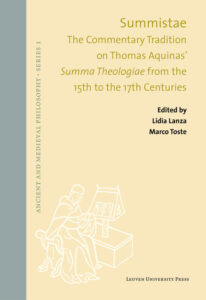The importance of the Summa theologiae on Late Scholasticism
Thomas Aquinas’ Summa theologiae is one of the classics in the history of theology and philosophy. Beyond its influence in the Middle Ages, its importance is also borne out by the fact that it became the subject of commentary. During the sixteenth century it was gradually adopted as the official text for the teaching of scholastic theology in most European Catholic universities. As a result, university professors throughout Europe and the colonial Americas started lecturing and producing commentaries on the Summa and using it as a starting point for many theological and philosophical discussions. Some of the works of major authors such as Vitoria, Soto, Molina, Suárez and Arriaga are for all intents and purposes commentaries on the Summa. This book is the first scholarly endeavour to investigate this commentary tradition. As it examines late scholasticism against its institutional backdrop and contains studies of unpublished manuscripts and texts, it will remain an authoritative source for the research of late scholasticism.
Contributors: Igor Agostini (University of Salento), Monica Brînzei (CNRS–IRHT, Paris), William Duba (University of Fribourg), Matthew Gaetano (Hillsdale College), Helen Hattab (University of Houston), Lidia Lanza (University of Lisbon), Mauro Mantovani (Salesian Pontifical University), Daniel D. Novotný and Tomáš Machula (University of South Bohemia in České Budějovice), Chris Schabel (University of Cyprus), Jean-Luc Solère (Boston College), Marco Toste (University of Fribourg), Andreas Wagner (Goethe University of Frankfurt), Ueli Zahnd (University of Geneva)
Contents:
Part 1: Framing the commentary tradition
- The Commentary Tradition on the ‘Summa Theologiae’
Lidia Lanza – Marco Toste - Thomas Aquinas as Authority and the ‘Summa Theologiae’ as Auctoritas in the Late Middle Ages
Monica Brinzei – Chris Schabel - The Genesis of a Genre? Late Medieval Commentaries on the ‘Summa Theologiae’
Ueli Zahnd - Theology in ‘via sancti Thomae’ at the University of Padua and the ‘Summa Theologiae’
Matthew Gaetano
Part 2: Discussions in the commentary tradition
- Remarks on the Debate on ‘Summa Theologiae’ I, q. 2, art. 2 in 17th-Century Dominican Theology
Igor Agostini - The Proofs of God’s Existence: The Discussion of the Value of the ‘Five Ways’ in the 16th-Century Iberian Commentaries on the ‘Summa Theologiae’
Mauro Mantovani - The Light of Glory in Molina, Vázquez, and Suárez
William Duba - Creation and Subsistence: Early Modern Commentators on the Subsistence of Prime Matter
Helen Hattab - Ways of Angelic Location: 16th-Century Dominican Summistae on ‘Summa Theologiae’ I, q. 52, art. 1
Daniel D. Novotny – Tomaš Machula - From Invincible Ignorance to Tolerance: Arriaga, Vázquez, and Bayle
Jean-Luc Solere - The Approach of Some Major Commentators on ‘Summa Theologiae’ II-II, q. 10: ‘De Infidelitate’
Andreas Wagner - Between Self-Preservation and Self-Sacrifice: The Debate in 16th-Century Scholasticism
Marco Toste - “Si peccavit per hoc quod fregit ostium, páguelo!”: The Debate on Whether the Prisoner Condemned to Death Can Lawfully Escape in the 16th-Century Commentary Tradition on the ‘Summa Theologiae’
Lidia Lanza - Indices
Index of Manuscripts 427
Index of Names ( –19th Century)
Index of Names (19th Century– )
